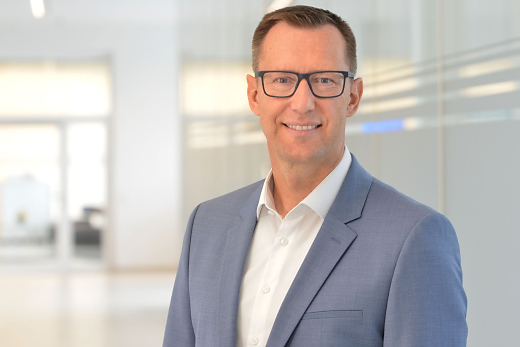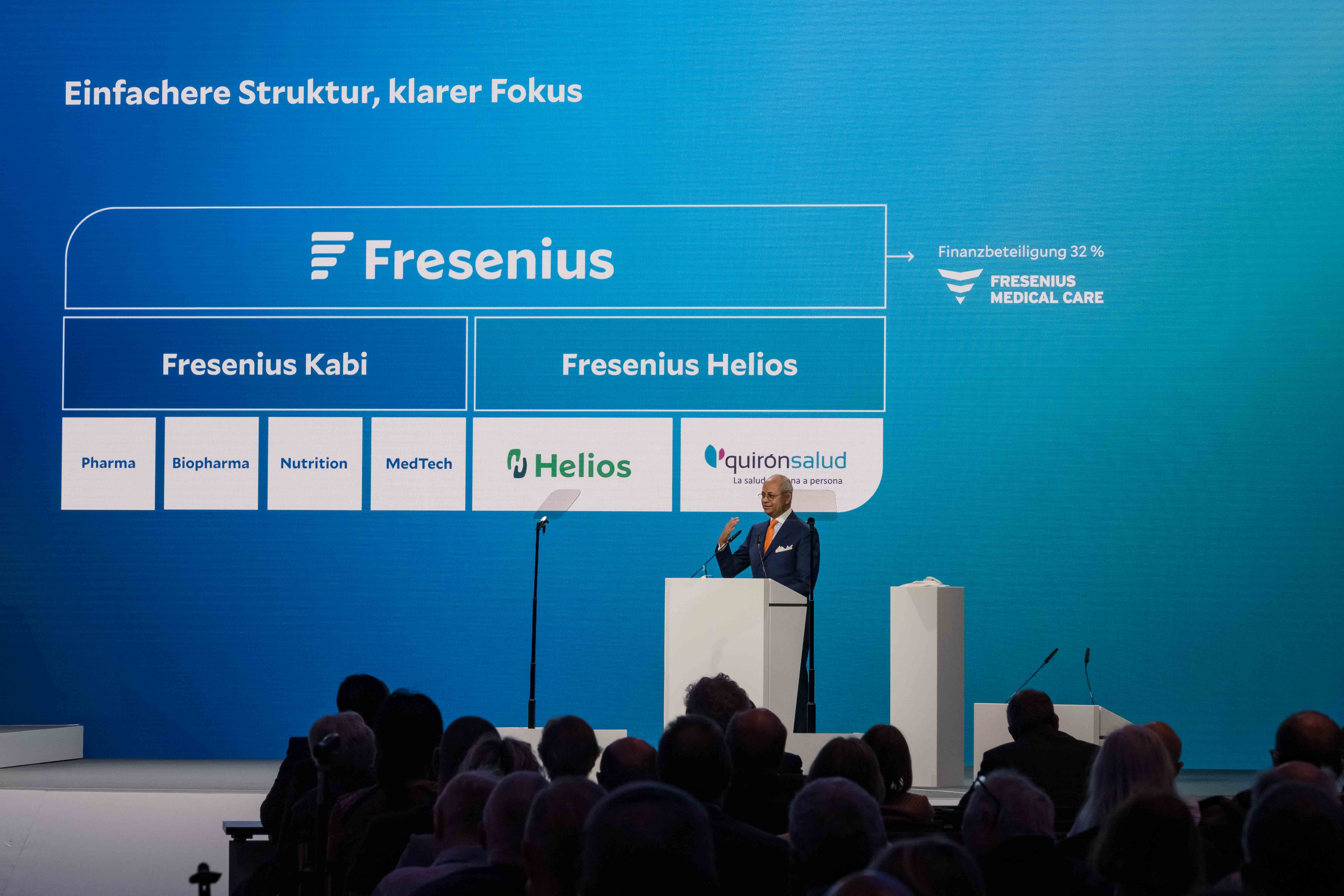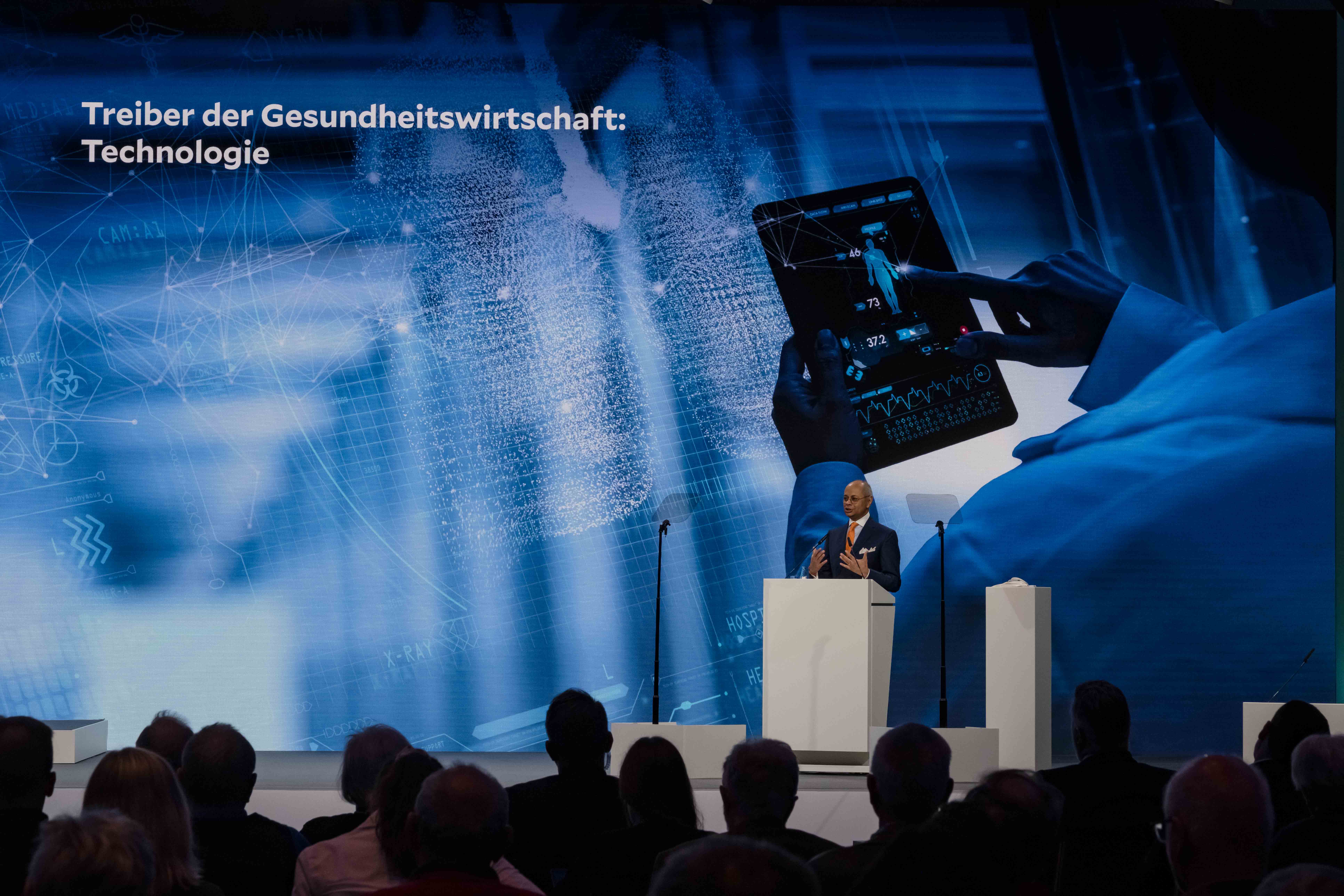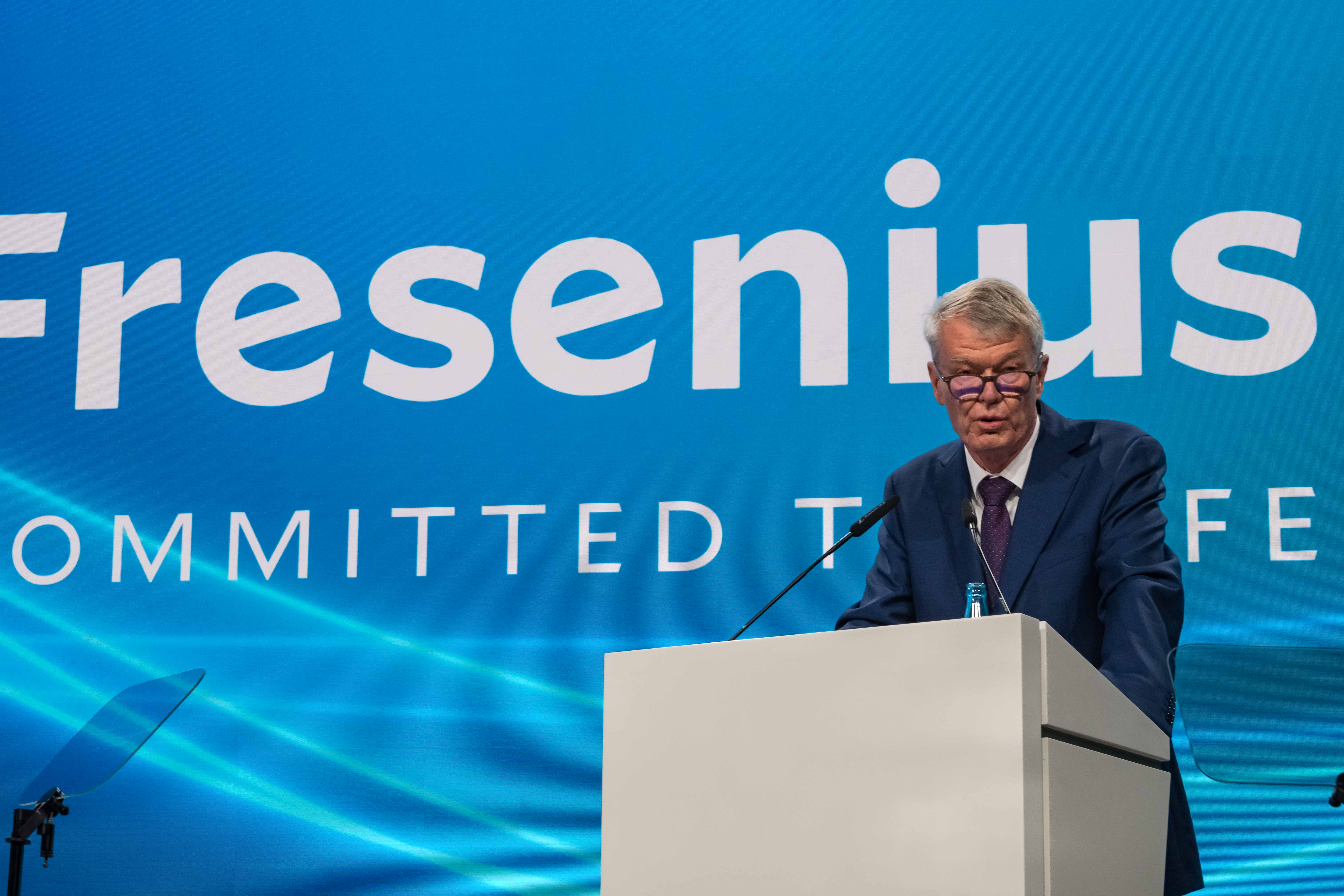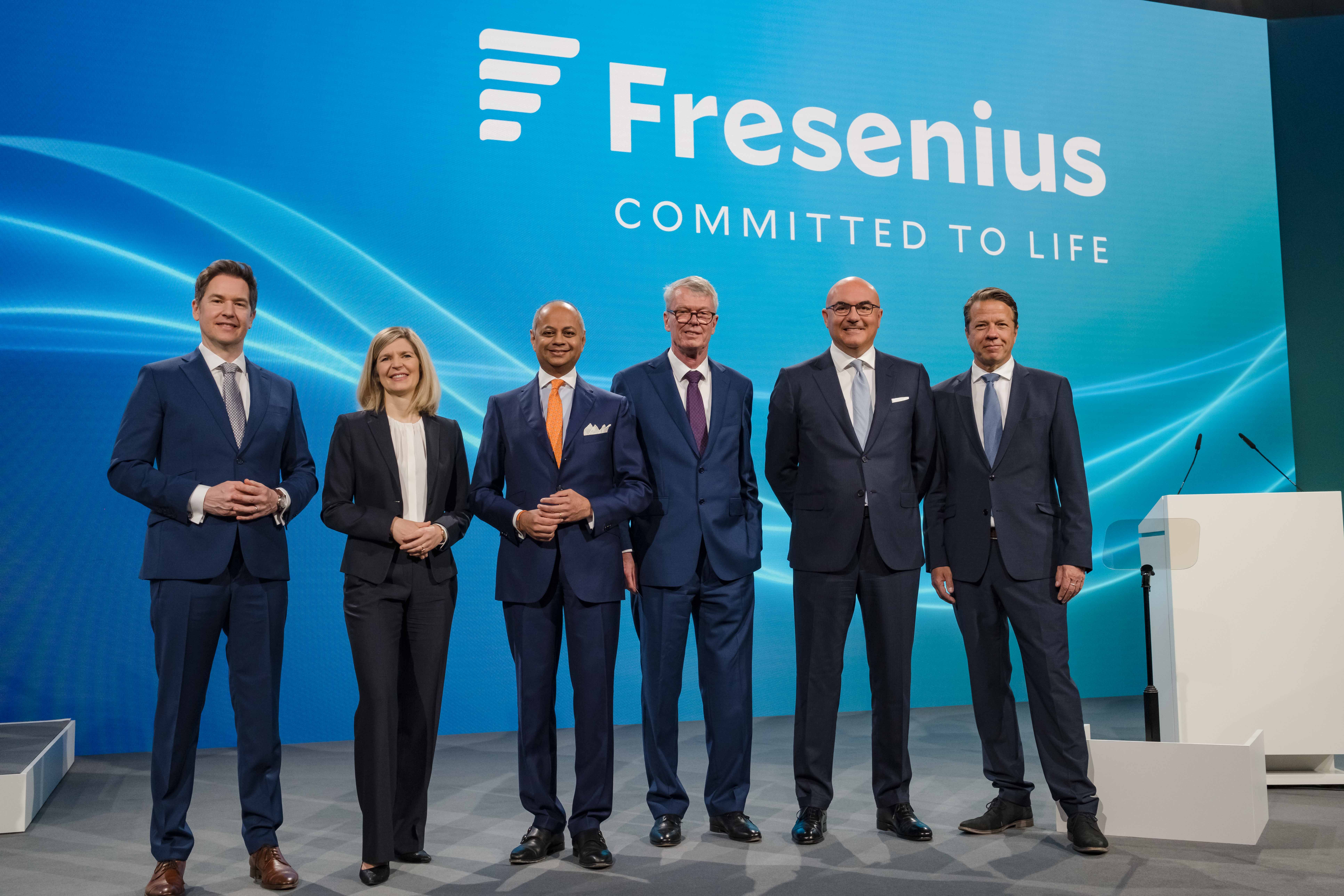Internet broadcast
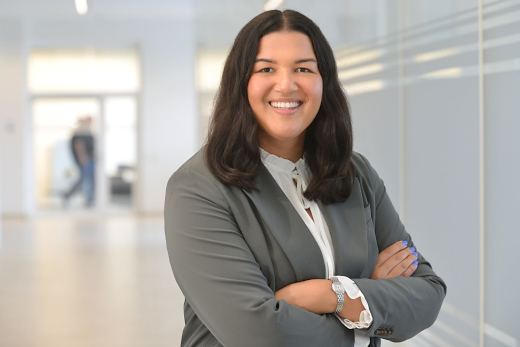
Sarah Greier
T: +49 (0) 6172 608-96215
sarah.greier@fresenius.com
- Dr. Sang-Jin Pak takes over the management of the Biopharma business at Fresenius Kabi
- Dr. Michael Schönhofen, Head of Biopharma and member of the Fresenius Kabi Management Board, leaves the company after more than 30 successful years
Dr. Michael Schönhofen, Head of the Biopharma business on the Fresenius Kabi Management Board, will leave the company on June 30, 2024, after more than 30 successful years. His responsibilities will be taken over by Dr. Sang-Jin Pak. The Supervisory Board has appointed him to the Fresenius Kabi Management Board with effect from June 1, 2024, thus ensuring a smooth transition.
Michael Sen, Fresenius CEO and Chairman of the Fresenius Kabi Supervisory Board: “Biopharma performed excellently in the first quarter of this year. With the rapid launch of our biosimilar Tyenne for the treatment of inflammatory and autoimmune diseases in the EU and the USA, we have also recently achieved two major milestones. I would like to thank Dr. Michael Schönhofen from the bottom of my heart for his tireless commitment and his excellent work and wish him all the best for the future. At the same time, I am delighted that we have been able to appoint Dr. Sang-Jin Pak, a recognized and proven biopharma expert with extensive international management experience, to help us further develop the innovative strength and momentum of our Biopharma platform.”
“Dr. Michael Schönhofen has made an outstanding contribution to the expansion of our Biopharma business into one of the three #FutureFresenius growth platforms. The seamless transition at the top of our Biopharma platform will provide the continuity needed to further increase our innovative strength and momentum,” added Pierluigi Antonelli, Fresenius Kabi CEO and member of the Fresenius Management Board.
Dr. Michael Schönhofen began his career in 1991 as head of the dialyzers business unit at Fresenius Medical Care. After working in St. Wendel in Saarland, Germany and in Ogden, Utah, USA, where he was responsible for setting up the plant, he took over responsibility for the disposables business unit for Europe, Asia, the Middle East, and Latin America in 2000. Dr. Michael Schönhofen has been a member of the Fresenius Kabi Management Board since 2004.
Dr. Sang-Jin Pak will join the Fresenius Kabi Management Board on June 1, 2024, and will be based in Bad Homburg, Germany. Dr. Sang-Jin Pak joins the company from Samsung Bioepis, a leading biopharmaceutical company based in Seoul, Korea. He has been Executive Vice President of the Global Commercial business unit there since 2018. Prior to that, he was responsible for GlaxoSmithKline’s German business for five years and was Managing Director of AstraZeneca in Korea from 2010 to 2013. Dr. Sang-Jin Pak studied medicine at Johannes Gutenberg University Mainz and healthcare management at the universities of Mannheim and Heidelberg.
Fresenius, via its Operating Company Fresenius Kabi, announced today that the U.S. Food and Drug Administration (FDA) has accepted for review the company’s Biologics License Application (BLA) for its biosimilar candidate of Prolia® (denosumab) and Xgeva® (denosumab).
The denosumab biosimilar is indicated for the treatment of osteoporosis in men and women, including glucocorticoid-induced osteoporosis, and bone loss due to prostate or breast cancer.
This BLA submission acceptance is the latest development in Fresenius Kabi’s continuing commitment to improving patient access to high-quality biological products through expanding its biosimilars development capabilities and product portfolio. Expanding the company’s Biopharma platform is a substantial cornerstone of #FutureFresenius.
Prolia® and Xgeva® are registered trademarks of Amgen Inc.
Fresenius, via its Operating Company Fresenius Kabi, announced today that the U.S. Food and Drug Administration (FDA) has accepted for review the company’s Biologics License Application (BLA) for its biosimilar candidate of Prolia® (denosumab) and Xgeva® (denosumab).
The denosumab biosimilar is indicated for the treatment of osteoporosis in men and women, including glucocorticoid-induced osteoporosis, and bone loss due to prostate or breast cancer.
This BLA submission acceptance is the latest development in Fresenius Kabi’s continuing commitment to improving patient access to high-quality biological products through expanding its biosimilars development capabilities and product portfolio. Expanding the company’s Biopharma platform is a substantial cornerstone of #FutureFresenius.
Prolia® and Xgeva® are registered trademarks of Amgen Inc.
June 26, 2024
virtual
SdK Anleger Forum
Event for retail investors (German only)
At today’s Annual General Meeting in Frankfurt am Main, the shareholders of Fresenius SE & Co. KGaA approved the proposals of the General Partner and the Supervisory Board by a large majority.
Wolfgang Kirsch, Chairman of the Supervisory Board, thanked the Management Board and emphasized Fresenius’ strong performance in extremely challenging geopolitical times. “Against this backdrop, Fresenius has performed well as a leading healthcare company compared to the competition and has improved significantly in operational terms.” He added that the #FutureFresenius program is strengthening Fresenius sustainably in the interests of all stakeholders. “The new Management Board team under the leadership of Michael Sen brings experience and complementary skills, team spirit and abilities, which will allow us to achieve the ambitious corporate goals and successfully implement #FutureFresenius,” said Kirsch.
CEO Michael Sen thanked the shareholders for supporting the #FutureFresenius journey, as well as the members of the Supervisory Board and Chairman Wolfgang Kirsch for their excellent cooperation. “We have successfully completed the first phases of #FutureFresenius and regained trust. We shall now tackle the remaining phases with motivation and optimism,” he stressed.
A large majority of 99.84% of shareholders voted in favor of approving the annual financial statements. The shareholders approved the Compensation Report for the 2023 fiscal year by 93.06%. Large majorities of 96.48% and 95.90% respectively approved the actions of the Management Board and the Supervisory Board in 2023.
At the Annual General Meeting of Fresenius SE & Co. KGaA, 72.65% of the registered capital was represented.
This release contains forward-looking statements that are subject to various risks and uncertainties. Future results could differ materially from those currently expected due to various risk factors and uncertainties, e.g. changes in business, economic and competitive conditions, regulatory reforms, results of clinical trials, foreign exchange rate fluctuations, uncertainties in litigation or investigative proceedings, the availability of financing and unforeseen impacts of international conflicts. Fresenius does not undertake any responsibility to update the forward-looking statements in this release.
- Fresenius is simpler, stronger, and more innovative due to #FutureFresenius
- Following a strong first quarter and higher expectations for the year as a whole, outlook improved at the beginning of May
- First in-person Annual General Meeting since 2019
- Fresenius’ new brand identity reflects its restructuring
After an excellent start to the 2024 fiscal year, DAX 40 company Fresenius is looking to the future with confidence. “Our aim for the coming years is to now establish Fresenius as an economically successful, innovative healthcare company focused on modern therapies,” said CEO Michael Sen at this year’s Annual General Meeting on Friday in Frankfurt am Main.
“2023 was a year of change and new beginnings here at Fresenius. We introduced our #FutureFresenius program to restructure our company, sharpen our focus, and continue successfully developing our company. We now want to tap into this positive momentum,” Sen stressed. The structural simplification, including the deconsolidation of Fresenius Medical Care and the exit from Vamed, as well as the focus on Fresenius Kabi and Fresenius Helios, is increasingly paying off. Both core businesses are growing profitably in highly attractive markets and were able to further increase their momentum in the first quarter of 2024.
With the presentation of the financial figures for the first quarter, Fresenius raised the Group’s outlook1 for the current fiscal year last week and now expects organic revenue growth of 4–7% and currency-adjusted EBIT growth of 6–10%.
1 The adjustment of the Group outlook reflects the fact that the forecast now excludes Fresenius Vamed, i.e. it is exclusively for the operating companies Fresenius Kabi and Fresenius Helios.
“We have regained our strength at just the right time. The healthcare industry is currently growing robustly and reliably. Indeed, it is one of the most attractive sectors,” Sen said. To this end, Fresenius is focusing its business on three platforms, which together create a market potential of up to €1 trillion: (Bio)Pharma, which includes chemical and biological drugs and clinical nutrition, MedTech, i.e. medical technology, which increasingly involves a combination of hardware and software, and Care Provision, i.e. medical care, whether in-patient or outpatient, or at home. Sen emphasized: “We are close to the patients. And this is exactly what sets us apart from purely pharma and medtech companies. And also from tech companies based in Silicon Valley.”
This proximity to the patients is also demonstrated by innovative products that enhance the medical quality and efficiency of care. Fresenius Kabi recently achieved two major milestones with the market launch of the biosimilar Tyenne for the treatment of inflammatory and autoimmune diseases in the EU and the USA. In Fresenius Helios hospitals, highly precise and tissue-friendly surgical robots assist in minimally invasive procedures. These robots are operated by a doctor by hand control and pedal. A total of 20 Da Vinci surgical robots are currently used at Helios hospitals in Germany.
Fresenius introduced a fresh and modernized brand identity at the Annual General Meeting. With its new slogan “Committed to Life”, Fresenius aims to be recognized as a leading healthcare company offering world-class therapies and improving people’s lives.
This year’s Annual General Meeting is the first in-person Fresenius shareholder meeting since 2019. Several hundred shareholders were expected to attend the Annual General Meeting at Messe Frankfurt.
This release contains forward-looking statements that are subject to various risks and uncertainties. Future results could differ materially from those described in these forward-looking statements due to certain factors, e.g. changes in business, economic and competitive conditions, regulatory reforms, results of clinical trials, foreign exchange rate fluctuations, uncertainties in litigation or investigative proceedings, the availability of financing and unforeseen impacts of international conflicts. Fresenius does not undertake any responsibility to update the forward-looking statements in this release.
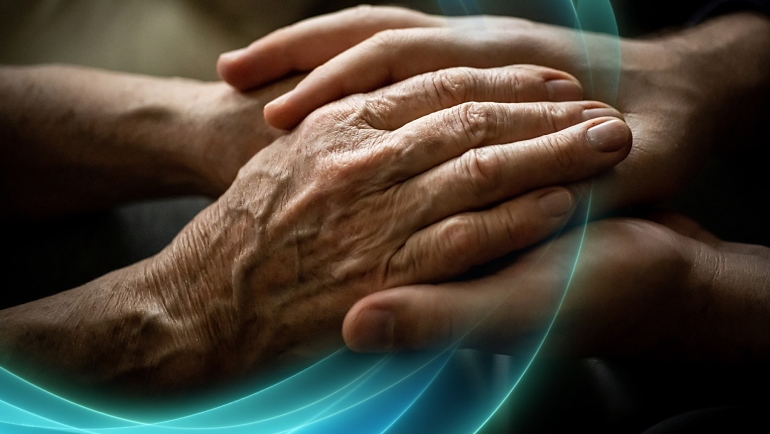
#FutureFresenius is making the company fit for the future: Fresenius is focussing on its Operating Companies Fresenius Kabi and Fresenius Helios, so on the three therapy platforms (Bio)Pharma, MedTech and Care Provision. They cater to system-critical areas of healthcare and are geared toward value creation and profitable growth. The two Operating Companies are to now also work together more closely. And the brand identity must reflect and support this.
Fresenius CEO Michael Sen introduced the new brand identity to the public at the Annual General Meeting in May 2024. It will now be rolled out across the Group by the end of the year.
“Fresenius is now fresher and more modern. The company logo has not been changed entirely, but rather revamped. Among others, we have updated the color palette to fit perfectly with the digital world. This brand image stands for a new Fresenius. Internally, we hope that the uniform brand identity will help us to grow even closer together as Team Fresenius. Because regardless where we work, we are all Fresenius. Externally, we want Fresenius to be recognized as a leading global healthcare company. A brand is always a promise. For us, our promise is “Committed to Life,” whereby we consistently strive to improve people’s lives”, said Michael Sen, CEO of Fresenius.

A person is more than their illness
With Fresenius Kabi, Helios and, Quirónsalud, the company has a unique portfolio and expertise. It understands the life dimensions of illness and health better than any pure medical technology or pharmaceutical company ever could. The new brand identity aims to support exactly this: The new Fresenius. Because regardless of where employees work, they are all Fresenius! Externally, the company wants to create a consistent image and to be recognized as a leading global healthcare company. Which is why Fresenius has revamped all aspects of the brand image: the logos, colors and shapes, fonts and images. Particularly the bright, modern color palette perfectly fits into the digital world. The Kabi, Helios, and Quirónsalud logos will remain. However, they will be incorporated into the new Fresenius world visually so that it is always clear that Fresenius is ONE team.
Fresenius sees that people are more than just their illness. It sees the lives they lead – within their families, their communities, and their jobs. It accompanies people throughout their whole lives, for better or for worse. Fresenius is there when it matters. This is what the entire #TeamFresenius works toward each and every day with its 190,000 colleagues.
A brand is always a promise; for Fresenius, a promise to its customers – and especially its patients. The Fresenius promise is “Committed to Life.” The company consistently strives to improve people’s lives.

Key brand elements: more than the sum of its parts
Logo
The new Fresenius logo expresses the company’s self-image as a symbol and word mark. The geometric lines of the existing logo have been replaced with more emotional and organic forms. At the same time, its shape reminds of the “F” in Fresenius and brings the company’s brands together with a new common color scheme.

“Bond for Life”
One key design element is the “Bond for Life,” which derives from the lifelines of humans. It symbolizes the different needs that humans have during various phases in their lives. The “Bond for Life” is inspired by the lifeline in the palm of our hands and signifies people’s needs during the different phases in their lives – with all their ups and downs. These reflect the connection between all of the Fresenius businesses, which support people at every stage in their lives as best possible.

Rollout by the end of the year
Fresenius has planned the implementation of the relaunch in phases: The first phase is completed with the Annual General Meeting and introduction of the new Fresenius brand at corporate level.
Now it's the Operating Companies' turn next: Their appearances will be harmonized with the new Fresenius brand presence and drive the launch forward together. Cross-business teams are already working together here. There will also be information and guidelines on this in the coming weeks - until then, the previous design of the Operating Companies will apply.
The final harmonization and completed new brand architecture should be jointly defined and introduced by the end of the year.




